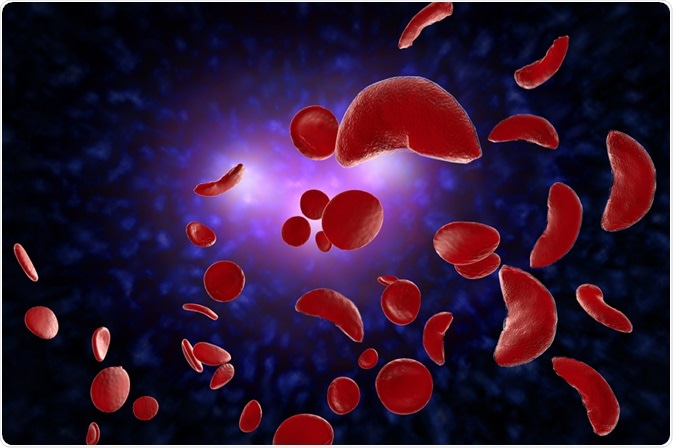When a child is diagnosed with sickle cell disease (SCD), they should be referred to a multidisciplinary specialist care team experienced in the management of SCD. This team may be made up of a pediatrician, hematologist, clinical psychologist, pharmacist, physiotherapist, social worker, and specialized nurse to help provide care for the various aspects of living with SCD on a chronic basis.

Sickle cell anemia disease (SCD) blood cells 3D illustration. Image Credit: Ezume Images / Shutterstock
Each patient usually has an individualized care plan that aims to:
- Prevent sickle cell crisis
- Provide pain relief during a sickle cell crisis
- Reduce the risk of complications, such as infections and stroke
- Manage patient-specific symptoms (e.g., anemia)
Sickle Cell Crisis Prevention
A sickle cell crisis is an episode of severe pain, which should be avoided if possible. Several lifestyle changes are thought to help reduce the risk of crises. These include:
- Staying hydrated
- Regular exercise
- Nutritious diet
- Avoiding smoking
- Moderating alcohol intake
- Avoiding triggers (e.g., heat, high altitude, stress)
Some patients tend to experience repeat crises regularly, despite practicing preventative techniques. If an individual has more than six episodes in one year, pharmacological prevention with hydroxycarbamide may benefit.
Hydroxycarbamide works to stimulate fetal hemoglobin production, a form of hemoglobin usually present in the early stages of life that isn’t affected by the sickle cell gene mutation. Additionally, its action can help to prevent acute chest syndrome for patients susceptible to this complication.
INCOMPLETE CELL - Award Winning Sickle Cell Documentary
Crisis Pain Relief
If a patient experiences a sickle cell crisis, analgesic medication can help ease the pain and manage pain in the home setting.
Paracetamol is the first-line choice for mild pain, as it is usually effective with a low risk of side effects. For mere serve pain, combination products with codeine may provide additional relief.
The patient must remain hydrated when experiencing sickle cell crisis, as fluid helps to thin the blood and promotes the movement of the sickle cells lodged in the blood vessels, allowing the blood to flow freely. A warm bath or towel can also help the crisis to pass more quickly.
In severe cases, hospital admission may be required to effectively control the related pain, with various pharmacological treatments, such as morphine injections.
Reducing Risk of Complications
Infection, stroke, and iron overload are common complications that affect people with sickle cell disease, and certain measures should be taken to prevent them from occurring.
Preventative antibiotic medication such as penicillin or erythromycin can be taken daily to prevent serious infections, such as meningitis. Additionally, patients should have up-to-date vaccinations of meningitis, tetanus, hepatitis B and influenza.
The patient’s risk of stroke should be established with a transcranial doppler scan to measure blood flow in the brain as a risk factor for stroke. An annual scan is recommended to identify at-risk patients who may require regular blood transfusions.
Iron overload can occur due to frequent blood transfusions, resulting in liver damage, delayed development and heart disease. Iron chelation therapy with deferasirox can reduce iron in the body by promoting the excretion of iron from the body.
Symptom Management
Some patients will require specific management for the symptoms that cause them the most troubles, which vary for each individual. These include:
- Anemia: Eating a healthy diet can help by providing adequate nutrients to compensate for sickle hemoglobin. Additionally, folic acid supplements can stimulate red blood cells, and blood transfusions may be required in more severe cases.
- Gallstones: May require gallbladder removal
- Avascular necrosis: Analgesic medication can help to ease the pain. In more severe cases, bisphosphonate medication can prevent bone loss.
- Leg ulcer: Should be managed with sterilization techniques and a bandage.
- Delayed growth: Although individuals should reach expected adult height at a delayed date, zinc supplements may be used to encourage growth.
- Delayed puberty: If adolescents have not yet reached the first signs of puberty by 14-15, hormonal supplements may be beneficial.
- Priapism: Individuals should drink fluids and frequently urinate to promote blood flow. Analgesics can be used to manage the pain.
How Gene Editing Is Curing Disease
References
Further Reading
Last Updated: Mar 1, 2021